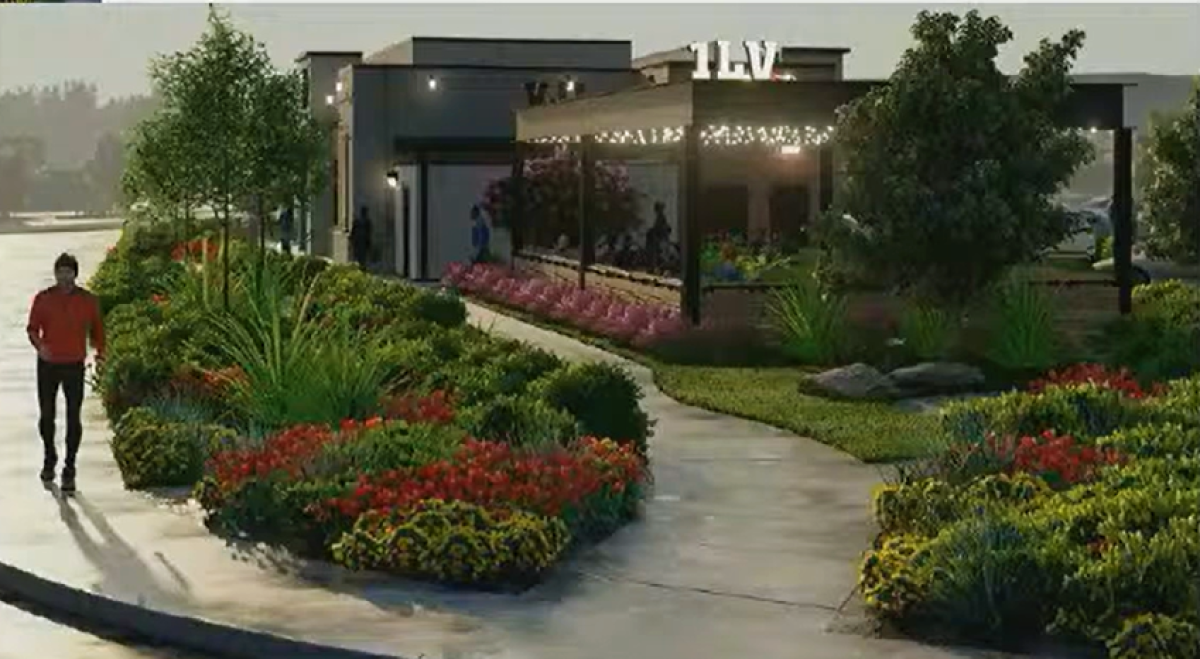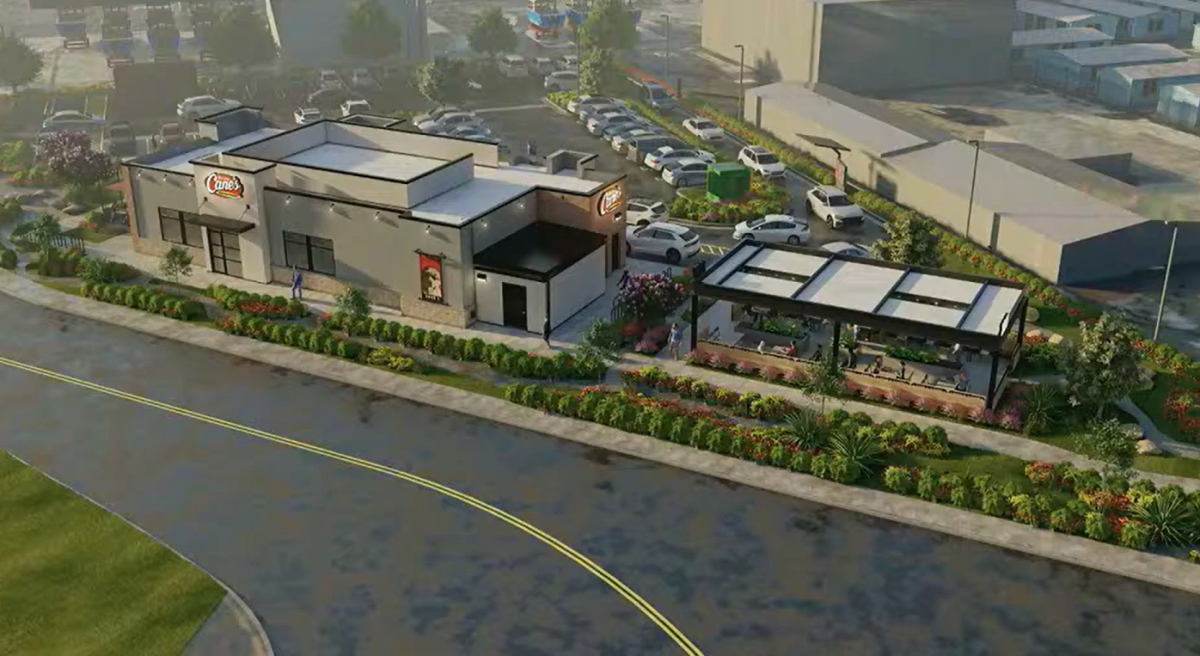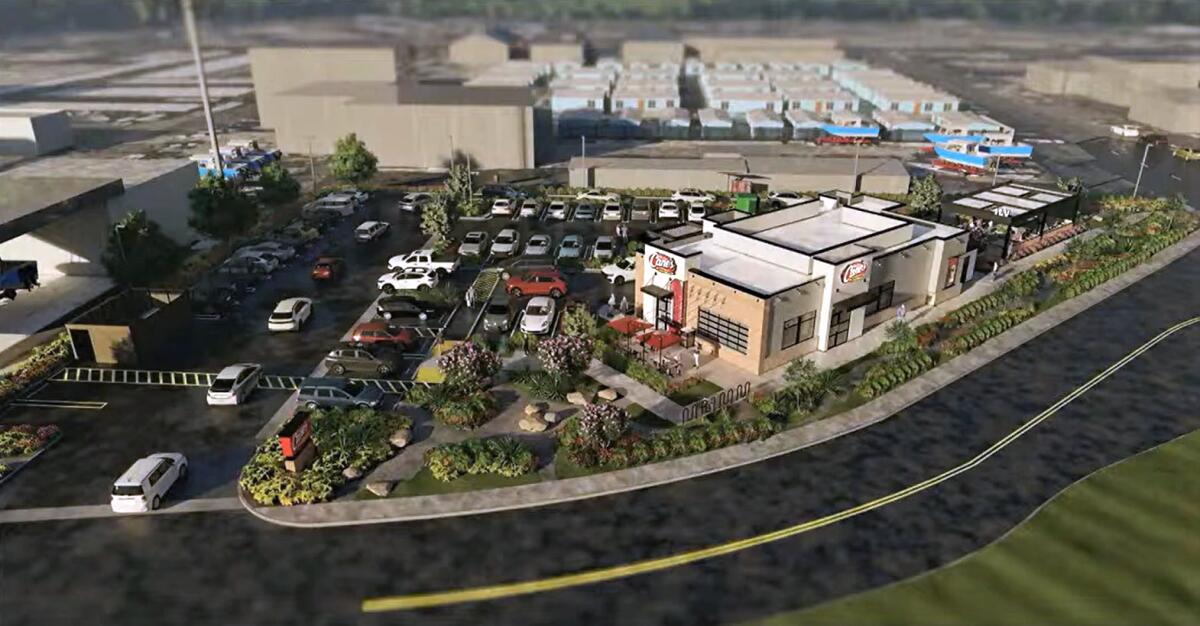Flying through civic hoops, a new Raising Cane’s is ready to roost in Costa Mesa

- Share via
Navigating a civic obstacle course laden with pitfalls over parking, traffic circulation and vehicle queuing, a Raising Cane’s drive-through proposed for Old Newport Boulevard crossed the finish line Tuesday, receiving narrow approval from the Costa Mesa City Council.
Panelists reviewed plans for a 2,913-square-foot fast-food restaurant with two outdoor dining patios fronting the street and a parking lot large enough to accommodate a two-lane drive through and 34 parking spaces on a vacant, 1-acre trapezoid of land just south of East 16th Street.
The fast-food chicken finger chain’s proprietors, who opened their first West Coast restaurant on Costa Mesa’s Harbor Boulevard in 2015, initially planned a traditional vehicle-forward layout for their second in-town location but were coached by city staff toward a more pedestrian- and bicycle-friendly design.

The process took three years and was hardly a slam dunk, as the city’s planning commission narrowly approved plans in a 4-2 vote, decreeing that the whole proposal return to the commission one year after opening for reconsideration.
That decision was called up for a de novo review by Councilwoman Arlis Reynolds, who wanted more consideration of the potential traffic and safety impacts on neighboring businesses and nearby residential areas. Others have expressed concerns the area, which falls in a corridor marked by Measure K for potential rezoning into housing, would not be best served by a fast-food use.
Council members Tuesday put applicants through their paces, examining in granular detail traffic studies produced by city-hired consultant Stantec, which determined an estimated daily trip count of up to 1,000 cars could be borne by the surrounding street infrastructure.
“The study concludes that the project would not exceed the city’s acceptable traffic levels, provides adequate parking, and the restaurant and drive-through operations will not interfere with nearby traffic circulation,” said city planner Christopher Aldana.
The council questioned the lot’s configuration, which would have vehicles entering and exiting from a single driveway on Old Newport Boulevard and, at one point, crisscrossing one another in a figure-eight design. Pedestrians attempting to go from parked cars to the restaurant would also interface with vehicle traffic.

They also expressed concerns about the 18-car capacity of the double-lane drive-through, wondering how backup would impact foot traffic and whether it might spill out onto already busy Newport Boulevard.
“I’m trying to do a little bit of math here, and it doesn’t feel like there’s a whole heck of a lot of margin for error before we potentially spill out onto the street,” said Councilwoman Andrea Marr.
But Raising Cane’s representatives reminded the council that a fast-food restaurant is not only an allowable use for the commercially zoned property, but was recommended by city staff at both the planning commission and council levels.
“I urge you to rely on the licensed professionals the city hired, along with the professional staff,” said real estate consultant Lester Tucker. “This is the right project in the right location with the right design by a phenomenal corporate citizen who’s invested in this community.”
Marice DePasquale, a public affairs consultant for Raising Cane’s, said the applicants collaborated with the Public Works Department to develop street signage for the area and a crosswalk across Newport Boulevard at 16th Street. She also reminded officials how the restaurant helped provide nearly 500 free meals to homeless individuals before the city’s bridge shelter had a kitchen.
DePasquale attempted to sweeten the deal further Tuesday by offering a $20,000 grant to the city for bike safety and education and another one for the city’s homelessness response efforts.
“[We] would additionally like to offer a $20,000 donation to the bridge center and will work with our crew, should this restaurant be approved in that location, to make sure when we have those types of issues on the site that we’re connecting with the right resource officers, the police department and otherwise.”
Mayor John Stephens said he appreciated the generous gesture but wanted to make sure the offer didn’t constitute an incident of quid pro quo.
“There’s nothing affirmative the City Council needs to do. However, a specter of quid pro quo would likely be there whether that’s true or not,” Assistant City Atty. Tarquin Preziosi advised. “The council could simply decline to accept that amount. But that’s not specifically required.”
After taking public testimony, Marr made a motion to overturn the planning commission’s approval of the restaurant that was backed by Reynolds and Councilman Loren Gameros. But Councilman Manuel Chavez, in a substitute motion, took a different view.
He reflected that many of the traffic flow issues being debated were the outcome of the applicant’s trying to adhere to design changes specifically recommended by the city.
“I don’t want to be jeopardizing an applicant for following the rules we put in place,” he added. “This [property] is zoned commercial. Until it’s rezoned differently, this is an allowable use.”
Stephens agreed.
“This is a business that came in, and we, in a way, brought them in and gave them a plan we’d like to see them do,” he said. “They were very accommodating and did it — that is a very weighty factor for me.”
City spokesman Tony Dodero confirmed Thursday that, in approving staff’s recommendation to uphold the planning commission’s decision, the council did not accept DePasquale’s offer of $40,000 in grant funding.
All the latest on Orange County from Orange County.
Get our free TimesOC newsletter.
You may occasionally receive promotional content from the Daily Pilot.




